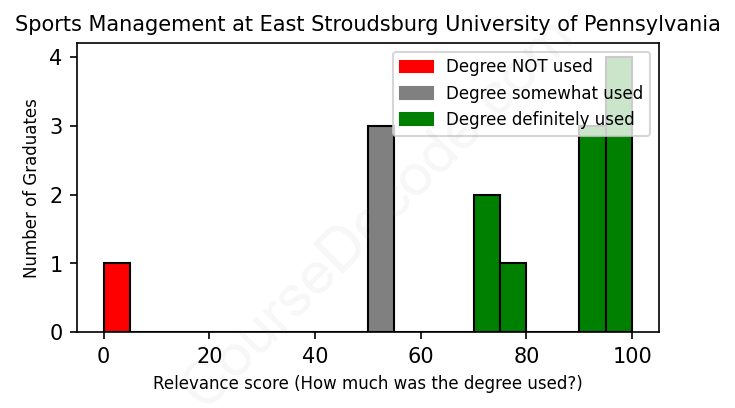
First, some facts. Of the Sports Management graduates from East Stroudsburg University of Pennsylvania we've analyzed , here's how many have used (or NOT used) their degree in their career:

These are estimates based on AI analysis of 14 LinkedIn profiles (see below).
The verdict? Above average. Overall, with an average relevance score of 75%, Sports Management graduates from East Stroudsburg University of Pennsylvania have a higher likelihood (+8%) of finding work in this field compared to the average graduate across all fields:
And for comparison, here's the chart for all profiles we've looked at across all degrees.
Also, after graduating, only 28% of these graduates have pursued further education other than another Bachelor's degree (such as a Masters degree or other), compared to the average across all profiles of 35%. This suggests a Bachelors degree is enough for most Sports Management graduates, and it's normal to look for work straight after graduation.
See the details:
|
Relevance score: 100% We think this person has gone into a career highly relevant to their degree. We think this person has gone into a career highly relevant to their degree.
DEGREE INFOGraduated in 2014 from East Stroudsburg University of Pennsylvania with a Bachelor of Science (BS) in Sports Management. No other secondary education since. JOB HISTORY SINCE GRADUATIONIntern Smg SportsPlex Jan 2014 - Apr 2014 Adult League Director  Smg SportsPlex Mar 2014 - Present ABOUTNo information provided. |
The top 10 most common jobs done by the graduates we've analyzed (ranked most common to least) are:
When looking at job trajectories for people who graduated with a Sports Management degree from East Stroudsburg University, there’s a pretty noticeable trend. Many graduates seem to gravitate towards roles in coaching, sports administration, and event management, which are all very much in line with what you’d expect from a sports management program. For example, you’ll notice positions like Assistant Coach, Head Coach, and various roles involving ticket operations demonstrate a solid application of their education. Leadership in managing sports programs or directing events at facilities like the Smg SportsPlex highlights how some graduates use their knowledge to directly impact the sports world. It’s clear that a number of them are indeed finding jobs that put their degree to good use.
However, the relevance of every single position varies quite a bit. While some roles, like ticket sales and coaching, are pretty straightforward applications of sports management skills, others, like retail sales positions at Under Armour or Starbucks, don’t really tap into their sports management foundations at all. In fact, several graduates end up in jobs where they either barely use their degree or work in unrelated fields altogether. While it’s great to see a decent amount of graduates succeeding in relevant positions, it’s also a little concerning that not every job aligns closely with their degree. This mix suggests that while the sports management degree opens up opportunities, it doesn’t guarantee that every graduate will stick to sports-centric paths in their careers.
Here is a visual representation of the most common words in job titles for Sports Management graduates (this is across all Sports Management graduates we've analyzed, not just those who went to East Stroudsburg University of Pennsylvania):

When looking at the career trajectories of graduates from East Stroudsburg University's Sports Management program, it's clear that many of them have made meaningful strides in the sports industry, especially within their first few years out of college. Typical first jobs after graduation often include internships or assistant roles, which are fantastic stepping stones into the field. For instance, recent alumni have started out as ticket office assistants, event planning interns, or coaching assistants—positions that not only leverage their degree but also provide valuable experience in sports and recreation settings. Even in their early job placements, many are finding themselves in roles that are directly tied to sports management, showcasing the relevance of their education.
Looking further down the line, around five to ten years post-graduation, a good number of these individuals have climbed the ranks to more significant positions like Assistant Directors, Associate Athletics Directors, and even involved roles in ticket operations for major universities. While some have ventured into related fields like coaching and equipment management, there's still a solid percentage of graduates who find themselves in roles closely aligned with their Sports Management focus—like those at sports organizations or educational institutions. However, it's worth noting that not every graduate has found their footing in the sports sector as some have transitioned into unrelated jobs or roles in different industries, which may suggest that while the program provides a good foundation, the outcomes can vary depending on the individual's career path and opportunities they encounter. Overall, graduates tend to gravitate toward relevant careers, especially in the early years, which is a strong indicator of the program’s effectiveness and the demand for skilled professionals in sports management.
Getting a Bachelor’s degree in Sports Management, like the one at East Stroudsburg University, is generally considered to be a bit on the easier side compared to more rigid programs like engineering or medicine. You’ll dive into a fun mix of classes about sports, business, and management, which can be interesting and engaging if you're passionate about sports. That said, it does have its challenges—like any degree, you still need to stay organized, keep up with assignments, and engage in group projects, which can sometimes be a bit of a hassle. Overall, if you’re into sports and motivated, you’ll probably find it manageable and enjoyable!
Most commonly, in the LinkedIn profiles we've looked at, it takes people 4 years to finish a Bachelor degree in Sports Management.
Looking at the career paths of these East Stroudsburg University graduates, it's a mixed bag when it comes to making decent money. Some folks, especially those who moved into roles like Director of Ticket Operations or Assistant Athletics Director, likely started pulling in good salaries as they climbed the ranks in sports management, especially in major universities and organizations. On the flip side, many others have taken on entry-level positions, internships, or coaching roles that don’t typically pay much—think school district jobs or assistant positions. So, while a few are likely raking it in, others are probably just scraping by, at least for now. It's a journey, and hopefully, they’ll all hit their stride as they gain more experience!
Here is a visual representation of the most common words seen in the "about" section of LinkedIn profiles who have a Bachelor degree in Sports Management (this is across all Sports Management graduates we've analyzed, not just those who went to East Stroudsburg University of Pennsylvania). This may or may not be useful:

Here are all colleges offering a Bachelor degree in Sports Management (ordered by the average relevance score of their Sports Management graduates, best to worst) where we have analyzed at least 10 of their graduates: